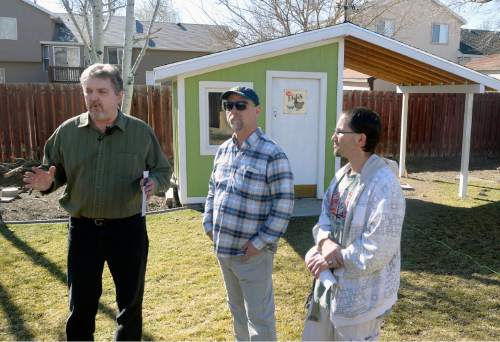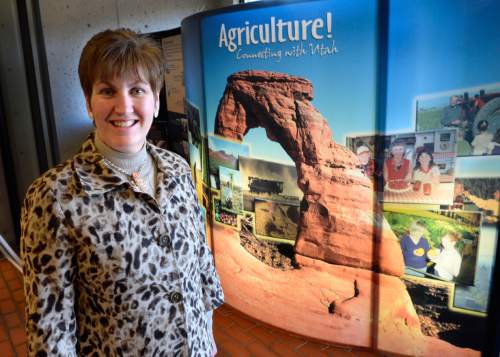This is an archived article that was published on sltrib.com in 2015, and information in the article may be outdated. It is provided only for personal research purposes and may not be reprinted.
Earlier this year, the federal government took over meat-inspection duties at the Dale T. Smith & Sons Meat Packing Facility in Draper, dealing a blow to the state agriculture department and the inspectors who had overseen the massive processing plant for years.
The federal takeover — done, in part, because Utah inspectors failed to check all animals properly — is just one of the problems plaguing the department since Director LuAnn Adams was appointed by Gov. Gary Herbert nearly two years ago, say those with knowledge of Utah's meat-processing industry and the Utah Department of Agriculture and Food (UDAF).
Adams creates a culture of favoritism and in several instances has appointed unqualified employees to key department positions, according to former state veterinarian Warren Hess, who has become Adams' most vocal critic. "The people she is bringing in, especially those in management, have no agriculture experience," he says.
An employee of UDAF for 11 years — and the acting state veterinarian for the past 14 months — Hess resigned three weeks ago mostly out of frustration, but also because the stress of the job led to health problems.
—
The charges • In several Facebook posts and during a telephone interview with The Tribune, Hess said Adams is knowingly violating state law because the current manager of the state's Meat and Poultry Inspection Program, whom she appointed, is not a licensed veterinarian. Hess pointed to the statute — 4-32-3(11) — which defines the "director of meat inspection" as a "licensed graduate veterinarian whose duties and responsibilities are specified by the commissioner."
Hess also claims Adams has given too much authority to Cody James, state director of animal industry, allowing him to oversee three significant divisions — meat and poultry inspection, state veterinarians and animal branding — even though, under state code, inspection and branding are duties of the state veterinarian.
"I was taken out of the decisions that were happening in meat inspection by the current director of animal industry, but according to Utah law, I should have been directing it," said Hess, adding that "veterinarians have the education and understanding of all aspects of animal industry, much better than people who don't have that background."
Hess said the public should be concerned, especially with the growing number of food recalls nationally. Meat inspection on "the federal level is almost entirely run by veterinarians," he said, "and Utah is not getting the same oversight from an educational and animal-health perspective."
—
The defense • Adams said Hess is wrong about her appointments and makes no apologies about how she runs the department.
"What I've tried to do is improve the department, and when things haven't been run right, I try to change them," she said. "Sometimes people have a hard time with that and they become disgruntled. Change is hard."
Adams believes that Noel McSpadden, the state's meat and poultry inspector, does not need to be a veterinarian; and before appointing James, she conferred with the Department of Human Resource Management and the attorney general's office. "We checked this out and it's just fine," she said. "In fact, it has been done before."
Wendy Peterson, the deputy director of DHRM, confirmed Adams' statement, saying UDAF "did work closely with the assigned human- resource director" when hiring for both positions. A spokeswoman for the attorney general's office did not immediately respond to a request for comment.
Adams made an impact on the department just four months after her appointment in February 2014 when an audit revealed that the state veterinarian at the time, Bruce King, had allegedly taken outside jobs and was making money on the side. King and Kyle Stephens, the UDAF's deputy commissioner at the time, were called into the office by Adams and, soon after, both retired.
Stephens was asked to leave because he knew about the conflict of interest and did nothing to stop it, Adams said.
"It was one of the hardest things I've had to do," she said. "But I can't apologize. We need to do what is right and move this agency forward. I'm conscientious of who I work for and taxpayer money."
Stephens, however, said he was never contacted by auditors and believes there was nothing in the report that would prompt a dismissal. Gov. Gary Herbert had asked Stephens to stay on as deputy commissioner when Adams was appointed, and "that didn't sit well with her," Stephens told The Tribune.
—
Qualifications? • After Stephens retired, Adams hired Scott Ericson, as the deputy director of UDAF — an appointment Hess sees as cronyism.
A one-time human-resource director for Box Elder County, where Adams was a commissioner, Ericson was a former campaign manager for the governor and worked previously for Congressman Rob Bishop. His educational background is political science and human-resource management, and Hess said he has no experience in agriculture.
Adams said she hired Ericson for his other qualifications.
"After the audit, what I needed was a person to come in and talk about policies and procedures and help with personnel issues," said Adams. "I have plenty of people with agricultural experience, that's why I hired Scott."
Adams pointed out that the veterinary pay issue led to changes in state law earlier this year prohibiting the state veterinarian from taking side jobs for additional pay. The new provision made it more difficult to hire a state veterinarian and the process took 14 months.
Last month, Adams appointed Barry Pittman to the post. A graduate of the Kansas State University College of Veterinary Medicine, Pittman most recently served as a supervisor for the USDA's Food Safety Inspection Service meat-inspection program in Utah.
Hess did not apply for the job.





